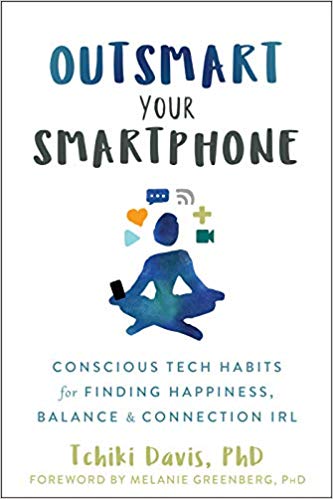Four guidelines for smart use of smartphones
 These days, you can’t go anywhere without hearing about how technology is ruining everything, including our happiness. There is some truth to this, but it’s not the whole story.
These days, you can’t go anywhere without hearing about how technology is ruining everything, including our happiness. There is some truth to this, but it’s not the whole story.
Technology can be bad for us—for example, when social media gives us FOMO (fear of missing out) or traps us in filter bubbles that prevent us from seeing multiple points of view on important issues. As a society, we are increasingly concerned that technologies like smartphones and social media result in more social comparison, bullying, and loneliness—all stumbling blocks to happiness. Technology seems to be bad for our happiness when it interferes with the mental, social, emotional, and behavioral processes that contribute to well-being.
But we often fail to realize (and discuss) the ways that technology can also support happiness and well-being—for example, when video calls let us talk to people all over the world or when apps or online articles give us a sense of purpose, joy, or excitement.
While researching my new book, Outsmart Your Smartphone, I discovered many of the ways technology can and does hurt our happiness. But I also discovered many ways technology can and does support our happiness … especially if we use it in the right manner.
If you’re trying to limit technology use for yourself or your kids, don’t forget about some of its potential benefits. Here are four research-based ways to spend your time on technology that can boost your health, happiness, and well-being.
1. Learn new goals and habits
Technology has given us access to lots of health and wellness resources, making it easier than ever to build and practice skills like gratitude, mindfulness, and emotion regulation online. You can now use apps to do everything from tracking your mood to practicing therapeutic breathing to building resilience.
Although not all wellness apps are equally effective, research suggests that evidence-based smartphone apps can indeed teach us the skills we need to optimize our well-being, help us stay motivated to do so, and even benefit our mental health. For example, research is exploring the benefits of mindfulness apps, apps delivering cognitive-behavioral therapy techniques (CBT, the gold standard of therapy), and apps that predict people’s moods and intervene with support at just the right time.
In my research, we found that a computer-based training in emotion regulation improved anxiety and well-being among those who had trouble regulating their emotions, suggesting that skills that promote happiness can be learned online.
2. Engage in activities that promote happiness
Social media is a space where we can connect socially and engage in kind and helpful behavior—activities that have been shown to boost health and well-being. For example, by sending messages on social media, we can express a kind word or share our gratitude—Thanks again for listening when I was having a rough day last week!—anytime we want, with ease, even to people far away.
A recent study suggested that among young people with symptoms of depression, social media was very important for helping them express themselves creatively, get inspiration from others, and even feel less lonely. A whole 30 percent of young people with elevated depression symptoms say using social media when they’re feeling depressed, stressed, or anxious usually makes them feel better, while only 22 percent say it makes them feel worse.
One participant shared, “Social media makes me laugh and keeps me distracted so that I have time to breathe and collect myself.” Another shared, “It just helps me feel outside myself for a bit and find interesting topics I’d like to ponder on.”
While social media does seem to be beneficial for some, it may not be the best strategy for overcoming mental health challenges, given certain problematic habits it might encourage—like comparing ourselves to the seemingly perfect lives of our friends and people we follow. But when we use it in conjunction with face-to-face social interactions, it does indeed appear to be a useful tool for self-expression and social connection.
3. Actively engage with your community
It’s true that people who engage in more passive Facebook use (e.g., scrolling without interacting with others) tend to be more depressed, one study found. The authors suggest that passively using social media might stimulate those “upward social comparison behaviors,” which can leave people feeling inferior (I suck!), envious (it’s not fair!), or both.
But people who use Facebook more actively (e.g., liking, commenting, and posting) tend to have lower levels of depression. Over time, they say that they get more positive feedback, likes, and social support from others, which may contribute to their lower depressive symptoms.
This suggests that certain ways of engaging with others online may be good for us, perhaps because they involve social connection rather than social comparison. By reaching out to others, engaging in meaningful social interactions, and strengthening our social bonds, we can likely improve our well-being online.
4. Find health-related information and stories
As we all strive to take care of our minds and bodies, a full 80 percent of young adults have gone online for health information. Indeed, we may use the Internet to learn about health and wellness challenges, read others’ health-related stories, or seek out a wellness practitioner. Research suggests that, by doing so, we may be able to feel more confident in our decisions and improve our communication with health providers.
Using the Internet in these ways may be important for those struggling with mental health issues like depression. For example, one participant says, “I have watched several people detail their fitness routines and how they used it to beat mental health disorders such as body dysmorphia and those affected by obesity and food addiction.”
In fact, 90 percent of young people with depression have gone online seeking information about mental health issues. Although we need more research to understand how they use this information, it does seem that the Internet is one more avenue where people in need seek out support. By giving us access to information about health, mental health, and well-being, technology enables us all to more easily seek out and discover the wellness strategies we need.
However, for the Internet to be a useful tool to find health information, it’s important to also increase our health literacy—namely, by ensuring people know which websites to trust, how to identify their health challenges accurately, and how to apply the information they discover.
 Technology—the Internet, smartphones, and social media—can hurt our happiness, particularly if we let it interfere with or pull us away from face-to-face interactions.
Technology—the Internet, smartphones, and social media—can hurt our happiness, particularly if we let it interfere with or pull us away from face-to-face interactions.
But, if we’re thoughtful about how we use technology, it also has the potential to make us happier. So we don’t necessarily need to get rid of our phones and computers or go on a full digital detox. Developers just need to be thoughtful about building technology, and we need to be thoughtful about using it, in ways that promote happiness.
– This essay is adapted from Outsmart Your Smartphone: Conscious Tech Habits for Finding Happiness, Balance, and Connection IRL (New Harbinger, 2019, 200 pages) by Tchiki Davis, MA, PhD, a well-being-technology expert and contributor to the Greater Good Science Center. Based at UC-Berkeley, Greater Good highlights ground breaking scientific research into the roots of compassion and altruism.


